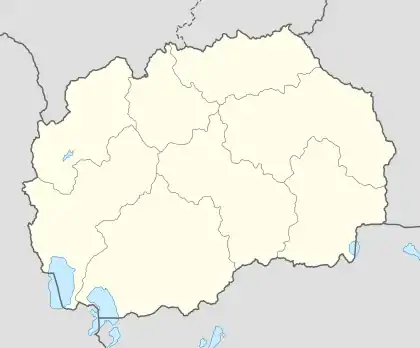Gopeš
Gopeš (Macedonian: Гопеш, Aromanian: Gopish) is a village in the municipality of Bitola, North Macedonia. It used to be part of the former municipality of Capari.
Gopeš
Гопеш Gopish | |
|---|---|
Village | |
 Panoramic view of the village | |
 Gopeš Location within North Macedonia | |
| Coordinates: 41°07′N 21°07′E | |
| Country | |
| Region | |
| Municipality | |
| Population (2002) | |
| • Total | 0 |
| Time zone | UTC+1 (CET) |
| • Summer (DST) | UTC+2 (CEST) |
| Car plates | BT |
| Website | . |
History
Gopeš is an old Aromanian settlement in the region and its establishment dates possibly prior to the Ottoman conquest of the Balkans.[1] During the first World War, Gopeš was occupied by the Bulgarian military who evacuated most of the Aromanian villagers and sent them into the interior of Bulgaria and Serbia.[1] The relocation of local Aromanians was due to Bulgarian forces being concerned that pro-Greek and pro-Serbian sympathies existed among them resulting in possible cooperation with the Entente Allies.[1] While in exile, some villagers had to fend for themselves whereas others for the Bulgarians did forced labour.[1] In 1919 only 110 families returned to Gopeš from a previous 300 families that inhabited the village prior to the war.[1]
Demographics
According to the 2002 census, the village had a total of 0 inhabitants.[2]
References
- Koukoudis, Asterios (2003). The Vlachs: Metropolis and Diaspora. Thessaloniki: Zitros Publications. ISBN 9789607760869. p. 420. "Pisoderi, Gopeš and Malovište are probably the oldest of the Vlach settlements in this group, and they most likely predated the Ottoman conquest."; pp. 468-469. "The Bulgarians evacuated the inhabitants of... Gopeš... and all these displaced persons (or hostages, one might call them) were relocated to the interior of Bulgaria and Serbia. Some were left to fend for themselves until the end of the war, while others did forced labour for the Bulgarians. The Bulgarians did not relocate all these people for their own safety; their basic motive was to clear the area of the pro-Greek and pro Serbian population groups which might have been inclined to co-operate with the Entente Allies."; p. 470. "Ultimately the destruction and deportations during the fighting along the Macedonian Front proved to be the coup de grace for most of the Vlach villages and settlements in Pelagonia. Gopeš is a typical example: it had some 300 families before the war, but only 110 returned by 1919."
- Macedonian Census (2002), Book 5 - Total population according to the Ethnic Affiliation, Mother Tongue and Religion, The State Statistical Office, Skopje, 2002, p. 187.
